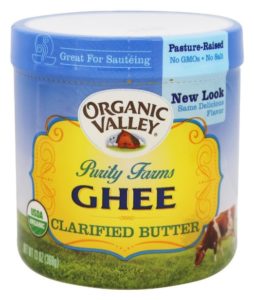 For several months now, I’ve been hearing about ghee. It’s basically a type of butter – yes, similar to regular butter like what you put on bread. So in that sense, it is more of a food than a supplement. But don’t write it off so easily! It has a host of health benefits. Keep reading.
For several months now, I’ve been hearing about ghee. It’s basically a type of butter – yes, similar to regular butter like what you put on bread. So in that sense, it is more of a food than a supplement. But don’t write it off so easily! It has a host of health benefits. Keep reading.
One of the most fascinating properties of ghee butter (this is the brand I like to buy) is that it appears to paralyze and possibly kill parasites. I have personally found this to be true. Dr. Klinghardt also reported on this property of ghee at one of his recent conferences. This benefit can be especially important, since many Lyme sufferers have parasites in their bodies, and since many pharmaceutical parasite treatments have side effects. Not to mention, even if you do use all the available pharmaceutical and non-pharmaceutical treatments, parasites and worms develop resistance to them, so new items to add to the arsenal are especially helpful. And, since ghee is a food, it can fit in easily to your daily routine! No pills to pop. Just spread it on some bread (gluten free!) or use it in other recipes.
At a later point in my recovery, I kept having nagging symptoms that wouldn’t succumb to the regular Lyme herbs and drugs. I later discovered that these symptoms were caused by larger parasites & nematodes (worms). This kind of discovery is becoming much more common in the Lyme disease community. In fact, a very well respected researcher who I have regular contact with just told me that her university colleague will soon reveal a nematode (worm) which is common in Lyme sufferers and which doesn’t just live in the gut, but which travels all throughout the body and harbors Borrelia and co-infections inside of it, protecting them from the treatments we use! Yuck!
Much to my surprise, ghee butter helped me get rid of worms faster than most of the aggressive herbal anthelmintic treatments out there, such as black walnut, wormwood, and cloves. Amazing!
One of the primary constituents of ghee is Butyric acid, or Butyrate, which is a highly studied substance. Your good gut bacteria are supposed to make Butyric acid on their own, but us Lyme disease sufferers have messed up guts due to all of our antibiotic use. Among other benefits, Butyric acid is immune-modulating, anti-cancer, promotes better sleep and cognition, and restores the gut to normal functionality.
This study shows that butyric acid can keep nematodes (worms) out of strawberry plants.
This study shows that butyric acid keeps fungal and nematode infections out of plant roots.
Lyme disease sufferers often keep chasing the “big three” – Borrelia, Babesia & Bartonella – when in reality, the final infections to be recognized are often nematode and fungal infections, which makes ghee a perfect fit for use by Lyme sufferers.
But the benefits of ghee butter don’t stop there. In fact, it is an Ayurvedic remedy, and one of the top remedies in that school of medicine, listed for many different ailments. So it has some profound healing powers. You can read more about how ghee is used in Ayurvedic medicine here. It also contains many vitamins and minerals and other healthy substances.
While not highly popular, ghee has been written about and used for Lyme treatment in certain cases, as you can read about in some of these links. Ghee is also easier to tolerate for most people than butter, as it’s levels of lactose and casein are near to zero.
I personally started using ghee about a month ago, and I’ve noticed some very interesting and distinct benefits from it. Which is more than I expected, given that it is more of a food than a supplement.
I think ghee makes a great Supplement of the Month for August, and I hope you’ll report back with your results!
Here’s the brand I have used and really like:


You must log in to post a comment. Log in now.